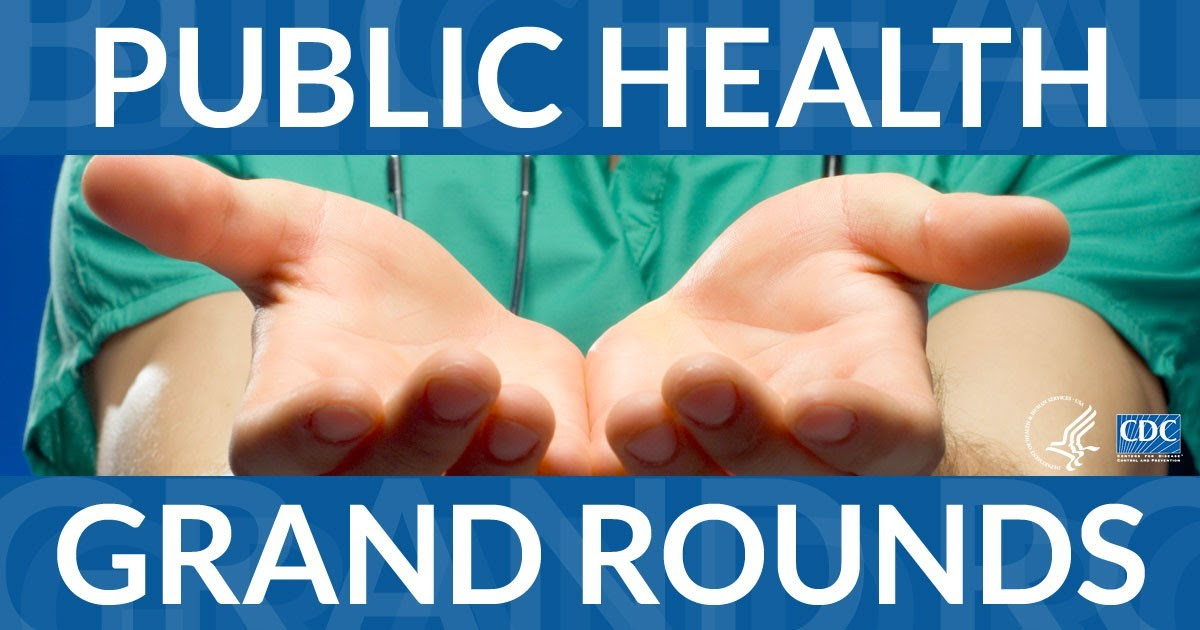
We are pleased to announce the next session of Public Health Grand Rounds, “Be Antibiotics Aware: Smart Use, Best Care,” which will be held on Tuesday, May 15, 2018, at 1:00 p.m. (ET). Join us in person or watch via live webcast from CDC headquarters in Atlanta, Georgia. Open captions are provided.
Antibiotics save millions of lives. Infectious bacterial diseases that were once deadly are now treatable with antibiotics. Unfortunately, 30 percent of antibiotic prescriptions are unnecessary and potentially dangerous. Antibiotics can cause mild to severe side effects. Antibiotic resistance is a serious public health issue causing 2 million illnesses and 23,000 deaths annually due to antibiotic-resistant infections in the United States.
Our speakers will discuss efforts to measure and improve antibiotic prescribing through antibiotic stewardship so that these medications are only prescribed when needed. Antibiotic stewardship also aims to ensure that the right antibiotic, dose, and duration are selected when they are needed. Join us to hear lessons learned from improving antibiotic use in pediatrics, and what providers and health systems can do to improve antibiotic use for adults.
"Be Antibiotics Aware: Smart Use, Best Care"
Tuesday, May 15, 2018
1:00 p.m. – 2:00 p.m. (ET) Global Communications Center (Building 19)
Alexander D. Langmuir Auditorium
Tuesday, May 15, 2018
1:00 p.m. – 2:00 p.m. (ET) Global Communications Center (Building 19)
Alexander D. Langmuir Auditorium
Presented By:
Katherine Fleming-Dutra, MD, FAAP
Deputy Director
Office of Antibiotic Stewardship
Division of Healthcare Quality Promotion
Centers for Disease Control and Prevention
“The Case for Antibiotic Stewardship”
Deputy Director
Office of Antibiotic Stewardship
Division of Healthcare Quality Promotion
Centers for Disease Control and Prevention
“The Case for Antibiotic Stewardship”
Jeffrey Linder, MD, MPH, FACP
Chief
Division of General Internal Medicine and Geriatrics
Michael A. Gertz Professor of Medicine
Northwestern University Feinberg School of Medicine
“Improving Antibiotic Prescribing for Adults”
Chief
Division of General Internal Medicine and Geriatrics
Michael A. Gertz Professor of Medicine
Northwestern University Feinberg School of Medicine
“Improving Antibiotic Prescribing for Adults”
David Hyun, MD
Senior Officer
Antibiotic Resistance Project
The Pew Charitable Trusts
“Antibiotic Stewardship Policies”
Senior Officer
Antibiotic Resistance Project
The Pew Charitable Trusts
“Antibiotic Stewardship Policies”
Facilitated By:
John Iskander, MD, MPH, Scientific Director, Public Health Grand Rounds
Phoebe Thorpe, MD, MPH, Deputy Scientific Director, Public Health Grand Rounds
Susan Laird, MSN, RN, Communications Director, Public Health Grand Rounds
Phoebe Thorpe, MD, MPH, Deputy Scientific Director, Public Health Grand Rounds
Susan Laird, MSN, RN, Communications Director, Public Health Grand Rounds
For non-CDC staff who want to attend in person:
Non-CDC staff must have prior security clearance. US citizens must submit a request to the Grand Rounds Team. A US state-issued photo ID (e.g., driver’s license, US passport) is required.
Non-CDC staff must have prior security clearance. US citizens must submit a request to the Grand Rounds Team. A US state-issued photo ID (e.g., driver’s license, US passport) is required.
Non-US citizens must submit their requests 20 days prior to the session to the Grand Rounds Team, and additional information will be required.
For individuals requiring reasonable accommodations:
It is the policy of CDC to provide reasonable accommodations (RA) for qualified individuals with disabilities to ensure their full inclusion in CDC-sponsored events. Employees are asked to submit RA requests at least 5 business days prior to the event. Please e-mail the request to grandrounds@cdc.gov
For questions about this Grand Rounds topic:
Feel free to e-mail your questions before or during the session.
Free Continuing Education is available for Grand Rounds Sessions
In order to receive continuing education (CE) for Public Health Grand Rounds sessions, please visit TCEO and follow these 9 Simple Steps. To find our courses use the search term “Public Health Grand Rounds”. To receive continuing education you must complete the online seminar evaluation and posttest. Continuing education will be available for up to 2 years and 1 month after the initial session offering. Target audience: physicians, nurses, epidemiologists, pharmacists, veterinarians, certified health education specialists, laboratorians, and others.
Objectives:
- List key measures of burden of disease involving morbidity, mortality, and/or cost.
- Describe evidence-based preventive interventions and the status of their implementations.
- Identify one key prevention science research gap.
- Name one key indicator by which progress and meeting prevention goals is measured.
CE certificates can be printed from your computer immediately upon completion of your online evaluation and posttest. A cumulative transcript of all CDC/ATSDR CE credits obtained through the TCE Online system will be maintained for each user. We hope that this will assist you in fulfilling the requirements for your professional licenses and certificates.
Learn more about continuing education on the Grand Rounds website.



































No hay comentarios:
Publicar un comentario